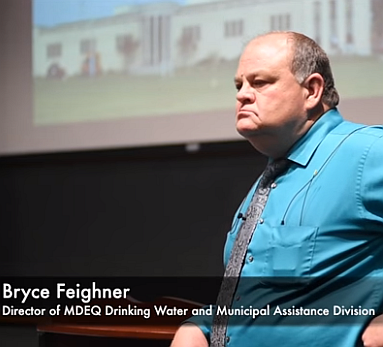 Anyone who listened to our podcast interview with Flint activist Melissa Mays knows that having their drinking water poisoned with the powerful neurotoxin lead is only part of the ongoing catastrophe they continue to deal with three years after the switch to the Flint River. In addition to elevated lead levels, residents are still experiencing skin rashes, bacteria-related respiratory infections like Legionnaire’s Disease, and a host of other impure water-related problems.
Anyone who listened to our podcast interview with Flint activist Melissa Mays knows that having their drinking water poisoned with the powerful neurotoxin lead is only part of the ongoing catastrophe they continue to deal with three years after the switch to the Flint River. In addition to elevated lead levels, residents are still experiencing skin rashes, bacteria-related respiratory infections like Legionnaire’s Disease, and a host of other impure water-related problems.
Despite this, Bryce Feighner, the outgoing director of the Michigan Department of Environmental Quality (DEQ) Drinking Water and Municipal Assistance Division, says he is convinced that they “hype” around what has come to be known as the “Flint Water Crisis” hurt Flint residents more than the poisoning of their water due to decisions made by Gov. Rick Snyder’s appointed Emergency Managers:
“[I]t was heartbreaking to see the people of Flint,” he said. “Certainly, there was hurt there — don’t get me wrong — but there was a tremendous amount of hype that hurt them even more than the actual event. I’m convinced of that.”
Feighner made the remarks in a keynote address to attendess of the West Michigan Air & Waste Management Association conference in Grand Rapids last week. He also made a number of other unsubstantiated claims the fly in the face of investigations, studies, and, in some cases, actual facts. For example Feighner, who is retiring next month to become a pastor, says that the lead poisoning in Flint wasn’t due to the highly corrosive nature of Flint River Water. He says it’s because of what he calls an “excessive” number of water breaks:
An “excessive” number of main breaks was one of several “confounding factors that you never hear anybody talk about,” argued Feighner, who said Flint had 312 main breaks in 2014 and 277 in 2015, but only 153 in 2013 and 138 in 2016. […]
“You can have the most perfect, non-corrosive water in world — however you choose to define that — and if you have water main breaks, extreme velocities, changes in flow directions; it’s going to strip every coating you’ve created off those pipes over the last several decades,” he said.
“This was a major cause of the event.”
This statement contradicts the findings of a task force appointed by Gov. Snyder to investigate the Flint Water Crisis as well as the findings of Virginia Tech professor Marc Edwards who was one of the first scientists to raise awareness of the Flint Water Crisis at the national level. Feighner claims these groups found it “easier to say ‘you didn’t add one part-per-million of phosphate and therefore this caused all this grief'” than to tell what he contends is the actual truth. Why? Because it’s “complicated.” In essence, he’s accusing scientists and policy makers of being lazy, many of whom have spent countless hours educating anyone who will listen – from Congress to journalists and beyond – about the water chemistry and other factors involved in both creating and resolving the Flint Water Crisis.
Feighner also erroneously puts the blame for the switch to the Flint River on the Flint City Council, a zombie lie repeatedly trotted out by Gov. Snyder’s most ardent defenders that has been thoroughly debunked by multiple sources (video evidence HERE):
On the decision to switch to the river in the first place, Feighner said, “you probably hear lots of things about ‘the state made the decision, the DEQ made the decision.’ I don’t pretend to know all the behind the scene things, but on the surface, the city council voted and approved that decision.”
Given Feighner’s attitude and loose grasp of the facts, it’s a blessing he’s moving into the clergy. Perhaps there he’ll regain his senses. But this raises other important issues. If the person in charge of our state’s public water supply is focused on blaming local officials rather than those in our state government responsible for this terrible public health calamity, this suggests that there is a major problem with the culture inside the DEQ that needs to be addressed and addressed quickly. State Rep. Jim Ananich agrees and released this statement regarding Feighner’s shocking comments:
The people of Flint are outraged that the state has someone involved in the Flint recovery who believes that the harm to our city is ‘hype.’ People with such beliefs have no place being involved in our city and I will be addressing this matter directly with the governor.
Let’s hope that Feighner’s attitude goes with him out the door. In any event, Gov. Snyder needs to do a complete review of his leadership team at the DEQ to ensure that this sort of pernicious thinking is eliminated for good.



